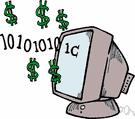digital computer
Also found in: Thesaurus, Medical, Financial, Acronyms, Encyclopedia, Wikipedia.
Related to digital computer: Hybrid computer
digital computer
n.
A computer that performs calculations and logical operations with quantities represented as digits, usually in the binary number system.
American Heritage® Dictionary of the English Language, Fifth Edition. Copyright © 2016 by Houghton Mifflin Harcourt Publishing Company. Published by Houghton Mifflin Harcourt Publishing Company. All rights reserved.
digital computer
n
(Computer Science) an electronic computer in which the input is discrete rather than continuous, consisting of combinations of numbers, letters, and other characters written in an appropriate programming language and represented internally in binary notation. Compare analog computer
Collins English Dictionary – Complete and Unabridged, 12th Edition 2014 © HarperCollins Publishers 1991, 1994, 1998, 2000, 2003, 2006, 2007, 2009, 2011, 2014
dig′ital comput′er
n.
a computer that processes information in digital form. Compare analog computer.
[1940–45]
Random House Kernerman Webster's College Dictionary, © 2010 K Dictionaries Ltd. Copyright 2005, 1997, 1991 by Random House, Inc. All rights reserved.
digital computer
A computer working with data represented in digital form, usually binary 0s and 1s.
Dictionary of Unfamiliar Words by Diagram Group Copyright © 2008 by Diagram Visual Information Limited
ThesaurusAntonymsRelated WordsSynonymsLegend:
Switch to new thesaurus
| Noun | 1. |  digital computer - a computer that represents information by numerical (binary) digits digital computer - a computer that represents information by numerical (binary) digitsbbs, bulletin board, bulletin board system, electronic bulletin board - a computer that is running software that allows users to leave messages and access information of general interest computer, computing device, computing machine, data processor, electronic computer, information processing system - a machine for performing calculations automatically file server - (computer science) a digital computer that provides workstations on a network with controlled access to shared resources mainframe, mainframe computer - a large digital computer serving 100-400 users and occupying a special air-conditioned room minicomputer - a digital computer of medium size multiprocessor - a computer that uses two or more processing units under integrated control microcomputer, PC, personal computer - a small digital computer based on a microprocessor and designed to be used by one person at a time von Neumann machine - any digital computer incorporating the ideas of stored programs and serial counters that were proposed in 1946 by von Neumann and his colleagues workstation - a desktop digital computer that is conventionally considered to be more powerful than a microcomputer |
Based on WordNet 3.0, Farlex clipart collection. © 2003-2012 Princeton University, Farlex Inc.